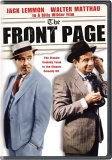| Reviews & Columns |
|
Reviews DVD TV on DVD Blu-ray 4K UHD International DVDs In Theaters Reviews by Studio Video Games Features Collector Series DVDs Easter Egg Database Interviews DVD Talk Radio Feature Articles Columns Anime Talk DVD Savant Horror DVDs The M.O.D. Squad Art House HD Talk Silent DVD
|
DVD Talk Forum |
|
|
| Resources |
|
DVD Price Search Customer Service #'s RCE Info Links |
|
Columns
|
|
|
Front Page (1974), The
The well-worn story, set in 1929 Chicago, traces Chicago Examiner Editor Walter Burns' (Walter Matthau) efforts to win back his ace reporter, Hildy Johnson (Jack Lemmon). Engaged to movie theater organist Peggy Grant (Susan Sarandon, in an early role), Hildy resigns from the paper the day before convicted anarchist Earl Williams (Austin Pendleton) is schedule to be hanged, amidst an ultra-competitive media circus where Hildy's talents are vital to the Examiner's circulation. Though Hildy wants to leave the exciting but all-consuming life of a newsman, a job that has already destroyed his first marriage, Walter selfishly wants Hildy for himself, and the tug-of-war between Walter and Peggy, with Hildy slowly being sucked back into the newsman's milieu, like an addict succumbing to his addiction, is structured not unlike a romantic triangle.
Though not up to the level of Hawks' film, Wilder's version of The Front Page is perfectly good for what it is, which is essentially a straightforward movie adaptation of the play. It's faithful in spirit if not dialogue almost to a fault, and Wilder seems to have decided early on that a recreation approach that stays true to late-1920s/early '30s play-speak was best and, for some exteriors, films much of it in an exaggerated manner (the use of fast motion, for example), recalling early '30s gangster movies and two-reel comedies.
The end result is like the cynicism of Ace in the Hole (which also has a newsman greedily manipulating a news event) coupled with the ensemble period comedy of the much-overrated The Sting which, significantly, had been an enormous success for Universal the year before this went into production. (One wonders what impact, if any, the Watergate scandal might also have had in green-lighting this production. Of course, Wilder doesn't exactly paint Hildy and Walter as 1929 equivalents of Woodward and Bernstein, either.) The hypocrisy of virtually every character, from the newsmen who blithely make up copy and ignore the facts, to the corrupt mayor (Harold Gould), government-appointed, crackpot psychiatrist (Martin Gabel) and sheriff (Vincent Gardenia) are not lost in Wilder and Diamond's screenplay.
The picture was criticized for its frequent, very '70s overindulgence of profanity, but its use by chain-smoking, streetwise reporters hardly seems unreasonable. It is hard to defend the puzzling gay stereotyping however, which comes in the form of David Wayne's fussy, mincing reporter, Roy Bensinger. Beyond the very odd casting of Wayne, who around this time specialized playing long-married curmudgeon types (as opposed, say, to the more overtly gay Edward Everett Horton, who played the part in the 1931 film version), the best jokes here lack the subtlety of the weakest ones in Some Like it Hot and are more smutty than funny.
Lemmon and Matthau, in their third film together (not counting Kotch, which Lemmon directed), are as entertaining as ever, with much natural chemistry, and they're supported by a dream cast of great character actors: Allen Garfield, Charles Durning, Herb Edelman, Cliff Osmond, Dick O'Neill. Austin Pendleton stands out as demonized convict; a medical examination scene with Gardenia and Gabel is the only scene that had this critic laughing out loud.
Much less successful is the casting of Carol Burnett in the essentially straight dramatic role of Mollie Malloy. Despite her huge success in television variety shows, she never quite meshed in films; there's always a disconnected air of unreality in her film work, and in a critical part Burnett isn't remotely acceptable.
Video & Audio
The good news is that Universal has remastered The Front Page in 16:9 anamorphic widescreen, preserving its original Panavision aspect ratio. Wilder was an underrated master of widescreen staging (and excellent title design), and his work here with cinematographer Jordan Cronenweth is no exception. The excellent widescreen transfer also shows off Henry Bumstead's superb production design and Burton Miller's costumes, all of which suggest a film far more expensive that it was. The mono sound (available in both English and French) is clean but unexceptional. Optional subtitles in English, French, and Spanish are included. There are no Extra Features, not even a trailer.
Parting Thoughts
No serious critic will ever put The Front Page at the top of their list of Billy Wilder's best films. It's just that after The Private Life of Sherlock Holmes (1970) and Avanti! (1972), The Front Page just seems so ordinary. But it's not bad; had the same film been directed by, say, Arthur Hiller, it would be remembered more fondly than it presently is.
** Ed Sikov's superb biography of Wilder, On Sunset Boulevard was referenced for this review.
Stuart Galbraith IV is a Kyoto-based film historian whose work includes The Emperor and the Wolf - The Lives and Films of Akira Kurosawa and Toshiro Mifune and Taschen's forthcoming Cinema Nippon. Visit Stuart's Cine Blogarama here.
|
| Popular Reviews |
| Sponsored Links |
|
|
| Sponsored Links |
|
|
| Release List | Reviews | Shop | Newsletter | Forum | DVD Giveaways | Blu-Ray | Advertise |
|
Copyright 2024 DVDTalk.com All Rights Reserved. Legal Info, Privacy Policy, Terms of Use,
Manage Preferences,
Your Privacy Choices | |||||||















